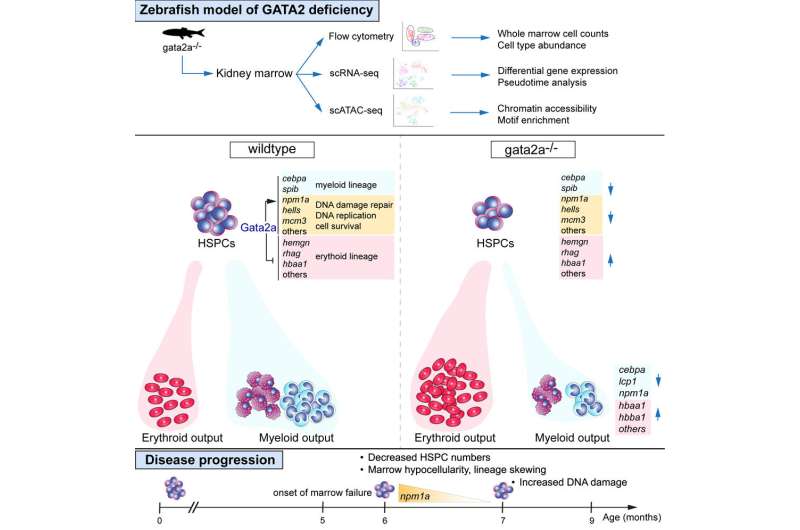This article has been reviewed according to Science X's editorial process and policies. Editors have highlighted the following attributes while ensuring the content's credibility:
fact-checked
peer-reviewed publication
trusted source
proofread
Genetic mutations blunt immune defenses in leukemia-linked rare bone marrow disorder

Patients with a rare genetic bone marrow disorder that puts them at increased risk of blood cancers could benefit from a discovery may lead to new treatments to slow or reverse the disease.
In a new study published in Cell Reports, scientists from the University of Birmingham and University of Warwick have identified that stem cells that are produced in bone marrow of affected patients may be producing significantly fewer immune cells used to fight infection. The mutation also results in fewer genes that are involved in repairing ongoing damage to their DNA and puts them at risk of developing blood cancers. The median age for patients developing acute myeloid leukemia who have this disorder is 20.
The genetic mutation which affects the GATA2 gene was identified using a zebrafish model, and could lead to a way to combat the way that both the rare disorder is treated as well as offering new clues for blood cancers that result from it.
Dr. Rui Monteiro, Associate Professor in the Institute of Cancer and Genomic Sciences at the University of Birmingham and lead author of the paper said, "GATA2 deficiency is a rare disorder, where the bone marrow fails to produce sufficient immune cells due to pathogenic mutations in the GATA2 gene.
"Our lab has a developed a model of the GATA2 deficiency and we have used genomics to discover how blood stem cells affected by the mutations in the GATA2 gene produce far fewer immune cells, particularly granulocytes and macrophages, which have this dual action of blunting the immune system and increasing the likelihood of DNA-based cancers.
"This work has thus uncovered a potential mechanism for disease progression in the human patients and will enable further investigation on ways to block, slow down or revert the appearance of blood cancers in GATA2 deficiency patients."
Lower immune cell production
Patients who have GATA2 deficiency can present at clinics with a wide range of symptoms including recurrent viral or bacterial infections, and the new study has identified the specific immune cells that are being produced in much smaller numbers.
The Monteiro lab based at the University of Birmingham developed a zebrafish model of this disease and used single cell genomics approach to better understand how disease progression occurs in these patients.
Blood stem cells affected by mutations in the GATA2 gene were found to produce much less granulocytes and macrophages and are therefore less able to fight off infections. They are also less able to repair damage to their DNA, which leads to increased genome instability and higher likelihood of acquiring further mutations that in turn lead to the occurrence of blood cancers at a younger age.
More information: Christopher B. Mahony et al, Lineage skewing and genome instability underlie marrow failure in a zebrafish model of GATA2 deficiency, Cell Reports (2023). DOI: 10.1016/j.celrep.2023.112571


















